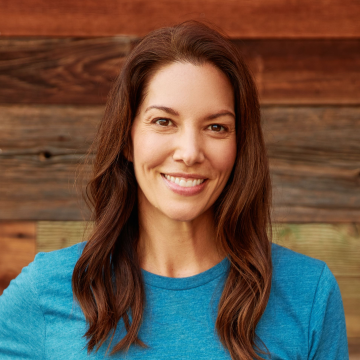We are constantly getting messages that we aren’t good enough or that there is something wrong with us or that we need to behave differently to get what we want. How are those messages affecting you and keeping you from getting what you want?
Need advice about something? Ask us here: ForcesOfEqual.com/Advice/
Transcript
Pam: [00:06] You’re listening to Not Bad Advice where our goal is to offer perspective that helps you improve one aspect of your life at a time.
[00:12] Pamela Lund.
CK: [00:20] And I’m CK Chung.
Pam: [00:22] And we hope that after listening you’ll think, “Hey, that’s not bad advice!
[00:38] When I uncover an issue in my psyche, I want to solve it right away and be done with it. Like, it’s something on my to-do list that I can just see it, do it, and check it off. But of course, deep-rooted issues aren’t like tasks that you can just cross off a list.
[00:53] So I’ll feel like I’ve worked through an issue and then it crops up again in a new place. It will look different and feel different at first, but inevitably the root issue will be the same. If you’re doing any sort of self-reflective work – therapy, life coaching, anything like that – you’ve probably started to notice the same thing. You likely have one or two core issues that are at the root of almost any problem you face.
[01:20] Those root issues are in your foundation. So everything built on top of that foundation is affected. You’ll go around patching cracks in the walls and ceiling leaks in the roof until you finally figure out that the foundation is what needs repair. Fixing the foundation is a lot of work, but once you address the root issue, the rest of the problems either go away on their own or are much easier to solve.
CK: [01:46] Scientists call that process root cause analysis.
Pam: [01:51] That makes sense. So if you’re doing root cause analysis on yourself, outside of experiencing trauma, there are actually only a few core issues that cause the majority of our problems. We just all express and react to these issues differently.
[02:06] Just like how a house with one story or two painted gray, blue, or tan, and with, or without a deck could all be built on the same foundation. We are all different, but we’re also all the same.
[02:20] My big root issue – the crack in my foundation – is worthiness or feeling unworthy. So we’re going to do a series of episodes on worthiness. We’ll talk about what it means, where it comes from. How do I identify if it’s an issue for you, ways feelings of unworthiness present in different circumstances and how to start untangling it from your thoughts.
[02:43] As I’m saying that I’m getting this visual of unworthiness as a thread that’s wrapped around and tangled up in my brain and I’m pulling on one end, slowly unraveling the knots and freeing my thoughts.
[02:57] Now you might be thinking that unworthiness isn’t an issue for you because you feel confident that you can have high self-confidence and high self worth and still feel unworthy in certain circumstances. I have quite a bit of self-confidence maybe too much sometimes, but that doesn’t stop worthiness issues from affecting me.
[03:17] Worthiness doesn’t dictate how confident or attractive or smart you feel. Worthiness is about how you’re able to receive what you feel like you deserve and how much metaphorical space you feel like you can take up.
[03:33] There are myriad factors that go into each person’s feelings of unworthiness, including influence from parents and other authority figures, systemic racism, patriarchy and misogyny, media, culture, religious beliefs, and on and on. We are constantly getting messages that we aren’t good enough, or that there’s something wrong with us. And that we need to behave differently to get what we want.
[04:02] And the more marginalized identities you identify with, the more you’ll be affected because of how systemic biases work. But anyone and everyone will receive the messages that they aren’t good enough in some way. And those messages burrow into our psyche and get internalized into self limiting beliefs at best and self hatred at worst.
[04:25] Fellow coach and podcaster Thais Sky calls this your worthiness wound, and I like that frame because it makes me think of a physical injury, which we tend to take more seriously than a mental one. And this is something to be taken seriously because it can affect every area of your life.
[04:43] Some psychologists say that this wounding process starts when we’re babies, we learn that we have to behave the way our caregivers want us to behave, so we can literally survive. Because as a baby, you are completely dependent on your caregiver for food, shelter, and safety.
[05:02] Then throughout your childhood, you test boundaries and learn what is considered acceptable behavior in your family, your friend, group, your school, your town, and all of the other social structures you’re in. All of that input gets stirred around in your brain soup, and you develop ideas about how you need to act to get what you want, what you deserve, how you’ll let others treat you and how you’ll treat yourself.
[05:29] Okay. So CK, can you think of ways that people who identify as men have to behave to be seen as worthy, or ways that unworthiness has shown up in your life?
CK: [05:40] Wow, that’s a pretty loaded question there…
Pam: [05:45] Well, you could start with whether you feel like it affects you.
CK: [05:47] Yeah, definitely. I would really question anyone who would say that unworthiness doesn’t affect them in some manner or another. I personally feel like I’ve had quite a unique experience throughout my childhood, in that I grew up as basically the only minority in my classes throughout grade school and high school.
[06:15] So I feel like I lived in different worlds, one being my family and the other being my peers. And so I’ve had feelings of unworthiness between both, and the unique thing is that they may be different and opposing. So I’ve had to deal with having to feel unworthy toward my parents about one thing that my peers would find worthy.
[06:49] So along the lines of being a man or more specifically an Asian man, obviously there’s a stereotype of Asians being good at math and smart, and there’s a level of me wanting to reject that stereotype amongst my peers. But of course my parents want me to get the best grades and ace every test and get a hundred percent of my report card.
[07:17] So I’ve had to deal with balancing these feelings of unworthiness between different groups. And so this might be a little more complicated than what we’re getting into, but I’ve definitely had feelings of unworthiness.
Pam: [07:32] I think that that is a great example for what we’re talking about, because it’s not going to present in your life as just one issue, it’s going to look different depending on what group you’re talking about or what situation you’re in. And you’ll have different issues come up at different points in your life, whether you’re in school or in a career phase, or in a relationship.
[07:50] These different feelings of unworthiness, it’s all the same root cause, but it’s going to be expressed in different ways and you’re gonna have different expectations placed on you at different points. So, I think that’s actually a perfect example of what we’re talking about.
[08:03] And along those same lines, for people who identify as women, we have a lot of different messages that we get based on where we’re at in our lives. the core message is always that you have to look a certain way to be And of course what that look is changes constantly, so you can never achieve it, even if was realistic.
[08:22] We’re also told that we have to be nice and nurturing. We have to be submissive and soft. But then at the same time, we have to be able to succeed in business while doing the majority of the housework and childcare. And don’t forget to keep up your appearance.
[08:34] There’s a lot of messages that we get from all over. So, if you aren’t able to do all those things, suddenly you become less than. For example, you become unworthy of material support if you aren’t career-driven, or you become unworthy of respect as a parent if you’re too career-driven, you become unworthy of pleasure if you don’t achieve the physical ideal. And not all women are effected by all of these expectations, but we’re all affected by some of them.
CK: [09:03] So, how has unworthiness shown up in your life?
Pam: [09:08] Uh, for me, it is, an issue, that we’ll definitely get into more in the next episode, but it comes out as an inability to receive without reciprocating. and have a lot of appearance issues as well. I definitely feel like even, if I’m laying around the house, I still need to.look presentable. I’ll still put together a casual outfit that looks good and my hair will still be combed, and, you know, I’ll still wash my face. Like, I can never be a total slob. And so I definitely have it present a lot of ways with physical appearance. But the ability to receive without reciprocating is my big struggle.
CK: [09:49] Well, I appreciate you not being a total slob.
Pam: [09:53] Thank you. Yeah, it’s for both of us.
[09:58] So, my unworthiness also manifests as being a people pleaser and an overachiever. So it makes it very difficult, like I said, for me to receive without reciprocating. And, you know, I could go on for 20 minutes about all of the places that this wound could have come from, which range from, like, the totally practical result of watching my parents struggle financially when I was a kid to the totally weird suggestion, by an energy healer that I carry guilt for bogarting all of the nutrients in the womb and starving a twin that I may or may not have had.
[10:30] The point is that we get these messages from countless places throughout our lives. And while it’s very important for some people to work through the source of their wounds in therapy or with a coach, sometimes it’s just as good to recognize that the entire world is trying to tell you that you’re not enough.
[10:50] So unless you have unresolved trauma that needs to be addressed, you might be best served by just accepting what is and working on what can be. And that’s what we can do using this medium. So in the next episode, we’ll talk about tangible ways that unworthiness is holding you back from preventing you from making more money to keeping you from developing intimacy in relationships and how you can start to feel more worthy.
[11:16] Until then just start noticing when you feel less than or undeserving, or when you feel like you need to adjust how you behave to please others. Notice if there are patterns in what brings up those feelings for you and what the common thread might be.
[11:34] And the taro card that I selected to represent today’s message is the Empress. This card is associated with Venus, which is the planet that corresponds with what we value, what we care about, and what we nurture. By extension, then, it’s associated with material joys and pleasure.
[12:24] The Empress card is an invitation to reflect on what you value and how you try to obtain those things. It asks you to reflect on where your not able to receive what you desire and where you feel like you have to earn love and respect, consider where you have abundance in your life that you’re not actually receiving because you don’t feel worthy of it.
[12:48] If you find yourself thinking, “Hey, that’s not bad advice” while listening today, we’d love it if you share the episode with your friends and rated it in iTunes.
[13:00] You can get in touch with us on Twitter, where I’m @Pamela_Lund and CK is @cKdisco.
[13:07] To find us on other platforms, visit ForcesOfEqual.com/Advice. There, you can also contact us if there’s something you need advice about. We’d love to hear from you.






